The coronavirus disease (COVID-19) pandemic continues to rage across the globe, with over 177 million people who have been infected as of June 20, 2021, in over 192 countries and regions around the world.
Despite the availability of vaccines, the United States Centers for Disease Control and Prevention (CDC) reports that there has been a lack of pregnant women who are getting vaccinated against SARS-CoV-2. The study showed that only 16.3% of pregnant women identified in the CDC’s Vaccine Safety Datalink had received at least one dose of a COVID-19 vaccine during pregnancy in the United States.
 Study: COVID-19 Vaccination Coverage Among Pregnant Women During Pregnancy — Eight Integrated Health Care Organizations, United States, December 14, 2020–May 8, 2021. Image Credit: Marina Demidiuk / Shutterstock.com
Study: COVID-19 Vaccination Coverage Among Pregnant Women During Pregnancy — Eight Integrated Health Care Organizations, United States, December 14, 2020–May 8, 2021. Image Credit: Marina Demidiuk / Shutterstock.com
The report, which appeared in the Morbidity and Mortality Weekly Report (MMWR), also demonstrates that the vaccination coverage rate was lowest among Hispanic and non-Hispanic Black women. Addressing the current barriers to receiving vaccines can help improve the system, as well as encourage more pregnant women to protect both themselves and their unborn babies from COVID-19.
COVID-19 vaccination among pregnant women
COVID-19 vaccines are crucial tools to end the pandemic. As of June 20, 2021, over 53% of the U.S. population has received at least one dose of the COVID-19 vaccine, with 149.1 million Americans who are currently fully vaccinated against COVID-19.
Recent studies have shown that pregnant women are at a heightened risk for severe illness and death from COVID-19 as compared to nonpregnant women of reproductive age. In the United States, pregnant women are eligible for and can receive any of the three COVID-19 vaccines that have been granted Emergency Use Authorization (EUA) from the U.S. Food and Drug Administration (FDA).
In an effort to identify COVID-19 vaccination rates among pregnant women, data from the Vaccine Safety Datalink (VSD) provided information on the administration of the first or second dose of the vaccines from Pfizer-BioNTech or Moderna, and a single dose of the Janssen (Johnson & Johnson) vaccine to pregnant women.
Between December 14, 2020, and May 8, 2021, more than 135,000 pregnant women were identified by the CDC. Of these, 16.3% had received at least one dose of a COVID-19 vaccine during pregnancy. Of the 135,000 women, 5.3% had initiated the vaccination process during pregnancy, while 11.1% had been fully vaccinated against COVID-19 during pregnancy.
In terms of ethnicity, the team found that the lowest vaccination rates were reported among Hispanic and non-Hispanic Black pregnant women. Comparably, those between the ages of 18 to 24 years old were found to be much less likely to receive the COVID-19 vaccine while pregnant as compared to those between the ages of 35 and 49 years, who reported the highest rates of COVID-19 vaccination while pregnant.
“Vaccination coverage increased among all racial and ethnic groups over the analytic period, likely because of increased eligibility for vaccination and increased availability of the vaccine over time.”
Further, the team found that the highest COVID-19 vaccination rates during pregnancy were reported for Pfizer-BioNTech, followed by Moderna and Janssen.
Need for improved outreach
The study findings emphasize the need for improved outreach to pregnant women, especially those from different racial and ethnic groups. Providing accurate and reliable information about COVID-19 vaccination and its benefits can improve vaccine confidence. The goal of these efforts is that more pregnant women may want to receive the vaccine if they are made aware of the benefits of vaccination.
“Addressing barriers to access as well as augmenting the scientific evidence regarding the safety and effectiveness of COVID-19 vaccines in pregnancy is critical. In addition, vaccine misinformation and hesitancy should be addressed.”
The researchers note that though COVID-19 vaccination coverage is low among pregnant women, it is projected to increase in the coming weeks as vaccine availability improves. Correcting vaccine misinformation can also improve acceptance and willingness to get inoculated.
The strategies to expand vaccination coverage should be implemented while simultaneously increasing the availability of accurate information to both health care providers and pregnant women. These public health efforts will inform pregnant women of the benefits of getting vaccinated, thus making them more confident in receiving a COVID-19 vaccine.
Journal reference:
- Razzaghi, H., Meghani, M., Pingali, C. et al. (2021). COVID-19 Vaccination Coverage Among Pregnant Women During Pregnancy — Eight Integrated Health Care Organizations, United States, December 14, 2020–May 8, 2021. U.S. Centers for Disease Control and Prevention: Morbidity and Mortality Weekly Report (MMWR). doi:10.15585/mmwr.mm7024e2. https://www.cdc.gov/mmwr/volumes/70/wr/mm7024e2.htm